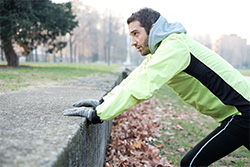Winter Fitness: Ways to Stay Motivated during the Cold Winter Months
 Sometimes, the winter months tend to slow people down. They’re less inclined to go out and more prone to bundle up and stay put. But motivation and exercise need to be maintained all year ‘round, even when the temperatures drop. Dr. Braulio Flores, an internal medicine specialist with the NewYork-Presbyterian Medical Group, discusses how to stay fit in winter and the health benefits it can offer both mind and body.
Sometimes, the winter months tend to slow people down. They’re less inclined to go out and more prone to bundle up and stay put. But motivation and exercise need to be maintained all year ‘round, even when the temperatures drop. Dr. Braulio Flores, an internal medicine specialist with the NewYork-Presbyterian Medical Group, discusses how to stay fit in winter and the health benefits it can offer both mind and body.
1. Why is physical activity in winter important?
Whether the exercise is done outdoors or indoors, physical activity in winter is important for a host of reasons—to prevent weight gain, to lower the chances of developing depression or physical illness, and to keep your body in shape and prepared for the spring.
2. What are the benefits to cold weather workouts?
Fitness experts and researchers have found that outdoor workouts in cold weather offer lots of benefits — such as increasing energy while decreasing tension, frustration, and depression. Plus, increased exposure to sunlight may help fend off seasonal affective disorder (SAD), a type of depression linked to seasonal changes. Cold weather can be invigorating; it stimulates your senses and gives you an overall feeling of well-being.
3. How can people stay motivated during this season?
There’s no doubt that the cold weather can pose challenges for many people. The days are shorter, and there are fewer hours to enjoy the outdoors. It helps to look ahead and have a goal for the spring. Look at the calendar and find outdoor events or activities around May (race, 5k, vacation) and use them as goals when planning your exercise program. Obtain a gym membership and work on strengthening exercises and different cardiovascular activities (treadmill, elliptical machine, stationary bike, rowing machine). If needed, find a coach or trainer to help you. Winter is a great time to do some cross training to work different muscle groups.
4. As a triathlete and a Level I Triathlon Coach, you understand the importance of staying motivated and staying safe during winter workouts. Can you offer any tips?
Indeed, as a physician and a coach, I am able to deliver a message to all of my patients from a very unique perspective. The bottom line message is this: “Invest in your health now, and it will pay off for you in the future.” Here are some tips:
- Outdoor exercise: It’s important to remember that temperature, wind, and moisture, along with the length of time that you'll be outside, are key factors in planning a safe cold-weather workout. You want to be careful not to develop frostbite (tingling or numbness on exposed skin) or hypothermia (intense shivering, slurred speech, fatigue). Seek emergency help right away should you have signs of hypothermia. It’s also important to dress in layers that you can remove and put back on as needed, depending on how much you sweat. Synthetic materials are best because they draw sweat away from the body. Avoid cotton, which stays wet next to your skin.
- Indoor exercise: If exercising outdoors in winter is too daunting, join a gym or take local classes that will serve as your go-to destination all season long. If necessary, hire a coach to help you along. Another option is to work out at home. There are plenty of exercise DVDs, programs and exercise equipment for use at home to help you get the same high-quality workout — without ever stepping outside the door.
- Maintain a healthy diet: Regardless of whether your exercise routine is indoors or outdoors, always have a healthy breakfast and a small lunch. If you must snack in between, reach for healthy snacks such as fruits, vegetables, and nuts. Limit the amount of bread, pasta, and pizza — only have them (in moderation) if you exercise that day; otherwise, it will result in weight gain. Finally, be sure to drink water or sports drinks before, during and after your workout, even if you're not really thirsty. You can become dehydrated, even in the cold, from sweating, breathing, and the drying power of the winter wind.
For more information, please visit nyp.org or call 877-697-9355 to find a physician.



